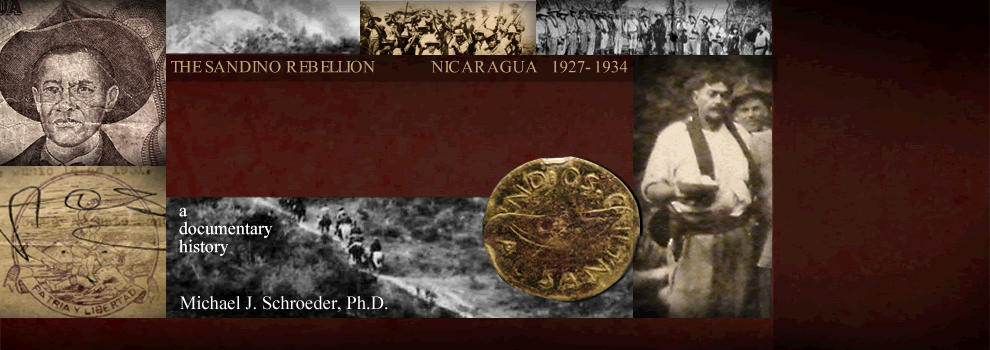|
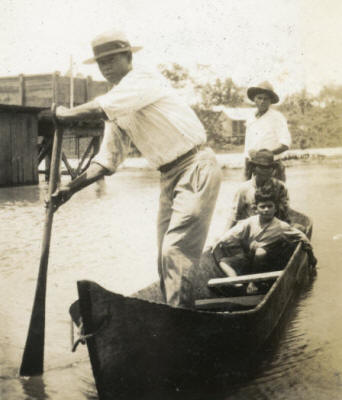 THIS IS THE FIRST PAGE
of documents for the FIRST HALF of 1929
on Nicaragua's Caribbean Coast
region, housing materials dated during the month of
January.
THIS IS THE FIRST PAGE
of documents for the FIRST HALF of 1929
on Nicaragua's Caribbean Coast
region, housing materials dated during the month of
January.
By way of context, the year
1929 dawns with Sandino’s
arch-nemesis Gen. José María
Moncada’s inauguration as president,
after what were widely considered
the freest and fairest elections in
Nicaraguan history up to that time. The Liberal Moncada’s election
undermines a key rationale of
Sandino’s nationalist rebellion —
armed protest against a government
run by Conservative lackeys propped
up by the USA — and sparks a wave of
desertions from Sandino’s cause
(e.g., see the cases of EDSN surgeon Dr. Domingo Mairena Hernández,
TOP
100 PAGE 26;
Rogelio Mangas, deserter from
Pedrón,
TOP 100 PAGE 29;
and EDSN Sgt. Major Alejandro
Molina,
TOP 100 PAGE 38).
By mid-year Sandino will leave
Nicaragua for a year-long sojourn to
Mexico to seek international
assistance for his flagging
rebellion.
The
documents below reflect the
Caribbean Coast’s marginal position
in the Sandino rebellion during this
period. Among the most noteworthy
are the numerous complaints against
the banana tax in The Bluefields
Weekly; the rustic hand-written 7
January petition from the Miskitu
Community Tungla asking for Marine
Corps assistance against “rebels and
out lawed people”; and the
mid-January radiograms indicating
that the EDSN forces remained far to
the west in the sparsely-populated
zones of Poteca, the Bocay Valley,
Garrobo, and Paso Real de Cua. Also
revealing is the 17 January
complaint against two Marines, Sgt.
Dougald K. McGregor and Cpl. Buddie
L. Booth, regarding an incident in
Puerto Cabezas the previous
November. The reports from the
Moravian mission stations also merit
attention, as do the other reports,
letters, & memoranda, only a handful
of which have anything to do with
Sandino.
|
|
PERIOD MAPS
|
|
1894 mosquito
shore

27 MB,
library of congress
|
1920s
Standard Fruit

6.5 mb,
US National archives
|
1928 Rio wanks
Patrol

3 mb, us
national archives
|
1931 Moravian

2.4 mb,
comenius press
|
|
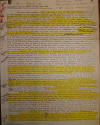
|
1 January
1929.
Report of the Year 1928,
Sangsangsta
Station, Moravian Church.
"The year under
review – 1928 – has been a year of much
interruption. The work in the
congregation has been much disturbed by
the political rumors of war and of other
foolish stories, which Indian produced
in their minds. According to the
fashion of the Miskitu people, many were
hiding in the bush, and neglected their
church attention very much.
Especially during the Passion week the
people from up the River, Asang,
Auasbila, Krassa etc. stayed away from
the services. And the reason was
being afraid, that they would have to
work for the Marines, and that then the
Liberals “would cut off their heads”, as
the rumors said. From the upper
River had only 12 members come to Sangta
for the Passion Week, and from down the
River, Wirrapani, only 14 had appeared
whilst the rest of them had all kinds of
excuses. It is remarkable that the
old race fear is still in the people,
and fear only kept them away from
serving God. The fear of the
Indians also grew stronger by the visit
of our former Commandante Marcus, who
came to Sangsangta with about 30 men
March 29th, when the Parsen just
returned from his tour with the two
visitors, Bishop Mueller and Bishop
Grossmann. When the Parsen was
still below Sangsangta, he gave three
blasts on his bamboo horn in order to
notify his people, that he is returning
home again. And suddenly somebody
stopped us. The Parsen did not
know what was up and he asked Rosindo,
his captain, behind him, what was the
matter and why our boat stopped, for the
Parsen was under a cover made out of
leaves and therefore he could not see
what was going on outside. Rosindo
told the Parsen, that a police tells we
must wait. Then the Parsen moved
forward and looked outside and behold
there was standing Marcus, our former
Magistrate of Sangsangta with a red
cloth around his hat and some other men
adorned likewise with such red colors,
stood outside. Then Marcus and two
other American-Latinos came to our
batteau and climber in and went with us
to the Sangsangta landing. Marcus
was watching behind Banana trees,
waiting for the Parsen to find out
whether he would bring Americans along
in his boat. But fortunately the
Parsen was alone, coming home from
Musawas. In connection to this episode,
the Parsenmaia has to report. But
when the three blasts of our bamboo horn
were given, then suddenly a number of
men, dressed in red and machetes in
their hands, some had rifles and other
guns, from where the sound of the three
blasts were heard. The Parsenmaia
told them that the Parsen is coming and
no Americanos, but the rushing people
would not listen. Then the
Parsenmaia told still Marchus that they
should be foolish and shoot for the
Parsen is coming home and giving signals
to his people, according to the country
fashion. Then Marcus, the headman,
with two of his men met us, when we were
near Sangsangta. He told the
Parsenmaia, that if there would have
been American in the batteau of the
Parsen, he would have given orders to
shoot them. Fortunately, there was
only the Parsen alone in his batteau.
The Captain Edson and his men had just
left the Wangks River about one week
ago. ¶ The same Marcus and
his gang went to Abraham Martinez, took
out about $ 500,00 worth of goods and
then they took from Anita Mueller about
$ 150,00 and in a hurry they left
Sangsangta for going up the River, in
order to raid Mr. Jose Lliset and
Auasbila. ¶ This same Marcus
had told the Indians, that they should
not assist the Marines, and if they do
it, they would suffer for it, for those
people who assist the Marines, heads
would be shortened. That was the
reason why the Indians were hiding from
the Marines when they were asking for
men to help them paddling etc. The
Indians were rather hiding in the bush
than get into trouble with the bandits.
This all brought an interruption in the
congregational work. Put also by
the absence of the Parsen’s family was
away from the Station from April 30th to
June 12th for the Conference in
Bluefields, and the Parsenmaia was with
the children in Puerto Cabezas for
getting her teeth fixed. Then the
Parsen was away again in Wasla for
Evangelistic School from August 9th to
September 17th. During the time in
August the Parsenmaia was in San Carlos
until the end of August, then she
returned to Sangsangta. ¶
The work up the River was also
interrupted by the Marines among whom
was a hald crazy man by the name of
Carrol, a lieutenant who was molesting
the girls and old women, according to
the report of some Kiplapini Indians,
and therefore several of the women in
Auawas, Ausabila, and Kiplapini went
over to Honduras, in order to hide away
from the Marines."
|
|

|
3 January
1929 (1800).
Radiogram from
(Capt. J. J. Burks?), CO Northern
Sector of Eastern Area, Bocay, to Major
H. H. Utley, Puerto Cabezas.
"8601 Your 9628
Dash 1610 True conditions this vicinity
among Natives as follows: Shortages
exists certain articles. Food such
as beans, rice, beef, and fowls said due
to Sandinista activities last spring.
This vicinity said to have been stripped
these articles that time by the bandits.
Appears to be abundance simple food,
bananas and other fruits, fish and game.
Seem to be few calls for other articles
food at local cantina here though most
men working and have money. No
evidence anything resembling state
starvation and season for gardening
close. Amount sickness said to be
average and none due to malnutrition.
1800."
|
|
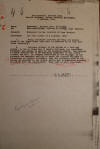
|
4 January
1929.
Disorders in the vicinity of Cape
Gracias, Capt. R.
B. DeWitt, Puerto Cabezas, to NCO
in charge, Cape Gracias, with
endorsements, p. 1.
"1. Until
otherwise directed you will not patrol
north of the Wanks River into what is
referred to as “the disputed territory.”
¶ 2. Periodic patrols in the
nature of a visiting patrol, by two or
three men to nearby villages are
considered desirable and should be made
as the occasion offers. The
objects of these patrols are to be
carefully explained to the patrol leader
and are: to observe conditions in the
village; by our presence and manifest
ability to reach the various villages to
discourage or prevent disorders; show
the residents that we are taking an
interest in the entire sector and to
establish friendly relations with the
inhabitants. This last is the most
important."
|
|
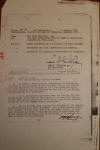
|
4 January
1929.
Disorders in the vicinity of Cape
Gracias, Capt. R.
B. DeWitt, Puerto Cabezas, to NCO
in charge, Cape Gracias, p. 2
(3rd
Endorsement, 9 Jan., Tom E. Thrasher,
Jr. by direction of Jefe Director GN,
Managua, to Major A. B. Sage, Area CO
Bluefields, and 4th Endorsement, 19
Jan., Sage to Jefe Director).
"1. Returned. From personal
observation of conditions existing in
the vicinity of Cabo Gracias I am of the
opinion that the territory in question
is in a very peaceful state and that
disorder and disturbances on part of the
Indian population are very infrequent.
¶ 2. It is considered desirable
that the Guardia Nacional extend their
activities to this place at the earliest
practicable date and it is planned to do
so as soon as the required personnel for
duty there becomes available. ¶
3. At the present time however the
strength of the Guardia at Puerto
Cabezas is being increased with a view
toward taking over control of Wawa Bar,
Wawa Boom, and Wawa Central.
Follow this movement the town of
Prinzapolka will be garrisoned and if
the necessary personnel can be recruited
it is planned to send a detail to Cabo
Gracias."
|
|
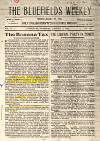
|
5 January
1929.
"The Banana Tax,"
The Bluefields Weekly,
p. 1.
"Last week when
our spirit was buoyant with hopes of
reconstruction from the reasonable and
favorable expectation of seeing a new
Nicaragua rise phoenix-like from the
ashes of the ruin in which the leaders
of Conservatism have willfully buried
this county—but not themselves, because
they have waxed fat with big bank
accounts in their favor, and large
coffee plantations—we were startled by a
radio from the Interior stating that a
bill was passed in the House of Deputies
to levy a tax of two cents on each bunch
of banana on board ship for export, --
but rejected by the Senate. ¶ Once in a
conversation with a conscientious and
very intelligent Nicaraguan, he said the
people of the Interior treat the Coast
as how Spain treated Nicaragua as a
colony. We do not know how Spain used to
exploit this country by shipping out its
riches, but we do know that we are
exploited by tax, tax and more tax. The
people of the Interior seem to think the
Coast is a detached colony. ¶ Now we are
catering for foreign capital to come and
cultivate our Atlantic coast lands.
Nicaraguans are not going to cultivate
them. They possess them from Columbus
discovered this country and have done
nothing. ¶ It is pitying to hear
everybody saying: the United Fruit
Company is coming. We are not trying to
be sacrilegious, but the second coming
of Christ is not as much a gratifying
hope of deliverance as the coming of the
United Fruit is to the people of the
Cast. They speak of this company’s
coming as if their heart is yearning to
see the Coast blossom overnight and
relieve them from hard times. How much
justifiable they are for this hope we do
not know, but we do know how they feel.
¶ Then if democracy is a government for
the people—which should mean for their
wishes—then it is but just that to give
a guarantee to prospective capital and
an incentive to the Cuyamel Fruit
Company and the American Fruit Company
this hideous gorgon—the banana ax—that
makes unexpected appearance in Congress
every now and then, at the bidding of
some political juggler, should be
beheaded once for all by a master stroke
from President Moncada. ¶ The best way
to kill this hideous banana tax is to
get Congress to pledge in a formal way
than bananas produced in Nicaragua shall
be exempted from tax for a period, at
least, ten years. ¶ The Atlantic
littoral as a business proposition, to a
great extent, is only good for bananas,
because there is no market for any other
agricultural product on a large scale,
except bananas. Our people must have
work and only bananas keep the bulk of
our population employed. ¶ With a little
horse sense reflection it is
self-evident that bananas are already
over taxed, because it is on them that
our general trade depends. We are
groaning under the burden of the high
cost of living which places the industry
at a disadvantage—both to master and
servant. A flourishing people means a
flourishing Custom House; and for the
people to flourish they must have work.
This is practical politics. So if
Congress cannot help the banana industry
then it should not hamper it with tax.
Tax will frighten prospective capital to
other countries. ¶ At present we are
tariff poor and land poor, hence our
hard times; and yet Congress wants us to
feel it a little harder. Is this a
venting of Congressmen’s spleen on us
for revenge? ¶ The planter paying a
capital tax. Does not this money come
from his bananas? The articles which he
consumes pay no less then (sic) forty
per cent duty. Does not this come from
the sale of his fruit. Then why more
tax? We want to hear a once for all amen
that bananas shall not be taxed,
otherwise our dreams are disturbed about
the Coast’s coming prosperity."
|
|
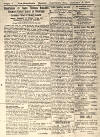
|
5 January
1929.
"The Banana Tax,"
The Bluefields Weekly,
p. 2.
|
|
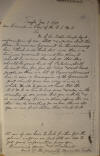
|
7 January
1929.
Petition, Stephen
Boudien, Miskitu Community Tungla,
to Commander in Chief of the U.S.M.C.,
Nicaragua.
"Dear Commander
in Chief of the U.S.M.C. ¶ Sir ¶ We of
this Canton Tungla beg to inform you of
our State and situation about this
place. It seems our Government has
throwed us away here. I think or we
think that since there is a business
movement around these places, it should
be no more than whrite that there should
be some kind of Protection, should be
sent here for fear of Rebels and
outlawed people, as there is a lot of
Liquor sold around here, or even a
Commission of the Government part should
pass here every once in a while. We
rites to you as we know that the
U.S.M.C. is here to keep peace and order
in the country. So we waits that you
will try to do something for us, or
please inform the one that can do
something for us here. Also we rites you
as our first station that should look at
us if we have to look further for this
please inform us. And still we hope to
get good informations from you. ¶
Remaining yours and Obedient, ¶ Head of
the Community Mosquitos Tungla ¶ Stephen
Boudien"
|
|
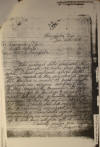
|
10 January
1929.
Report, Sgt.
Albert E. Simmonds, Prinzapolka,
to Major H. H. Utley, Puerto Cabezas, re
Tungla petition.
"Sir, ¶ The
enclosed letter was sent to me from
Tungla, 120 miles from Prinzapolka. I
have questioned several people here in
regards to this subject and it seems
that there are a number of people up the
river who are carrying revolvers and
seem to have considerable ammunition. It
will take from five to ten days to get
up the river and look over this
situation, may I have permission to
leave this post in charge of Pat Jensen
and make this trip myself. I have this
to recommend my request, I have a
suspicion to a certain party who is
bringing in communication in very small
quantities and up to date have not been
able to catch him. ¶ Obediently waiting
your orders, ¶ Albert C. Simmons"
|
|
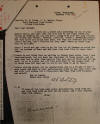
|
11 January
1929.
Letter from A. E.
Webster, Bocay, to Capt. M. A.
Edson, Poteca.
"Dear Capt.
Edson:- ¶ I sent you a short note
yesterday on one of your Ration Boats,
and also sent you four men of the eight
asked for. Today am sending you six men
more along with your men Juan Tinorio
and Cortez, Viz - NORATO, SERBULO,
PATRIOCIO, YONICIO, BERNADINO, PATRIC.
The four later are young Sumu boys, but
they are obedient and wiry little
fellows, and I believe for your small
boats up there they will do all right. ¶
Sorry I could not get them to go for the
1st of January as asked for but, on
account of Xmas and New Year they don’t
like to leave their homes. ¶ Please do
not think that on holding up former Boat
crews, that I was inconvenienced, but
you know the character of these people,
and in each case had to make them
believe that you were at fault and not
myself, so as to always get off your
next Boat to the danger zone, as it
takes some red tape and lies to get them
to go up there. ¶ Before closing please
let me congratulate you as a friend of
what I have heard and read of your
achievements since we saw each other
last and with best wishes for a
Prosperous New Year from both Thompson
and myself, ¶ beg to remain ¶ Yours very
truly ¶ A. E. Webster ¶ P. S. If some of
the boys don’t prove satisfactory, weed
them out and send them down on your
ration boats, and I will replace them
with others. ¶ Vale."
|
|
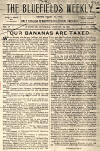
|
12 January
1929.
"Our Bananas Are Taxed,"
The
Bluefields Weekly, p. 1.
"We had thought
that the very brilliant and strong
opposition of Senator Hooker and Senator
Sandoval had defeated this ruinous bill
for a tax of two cents per count bunch
as export tax on bananas, but behold we
are again startled to hear that it has
passed in congress and is now or soon to
be a law of this country. ¶ In our last
issue we inferred that bananas are
already indirectly overtaxed, because
what foreign articles the planter and
his servants consume pay a very high
duty. ¶ Nearly the whole sum which the
Custom House collects from a population
of about 30,000 comes from the
evolutions of the banana industry. ¶ The
excise tax collected on aguardiente and
tobacco comes from the same evolutions
of the banana industry. And we think the
excise tax on these two articles is
higher than in any other part of the
world. The business of the Coast depends
on bananas. This is no poetry. ¶ In
Nicaragua the banana business is a poor
business. If it were not so the ships
which ply in trade here would not be
sailing out with only short cargoes, two
ships a week, and yet the Coast has been
trying to produce bananas for over forty
years, over a wide territory, and so
many planters trying to produce two
thirds of our production-the Cuyamel
Fruit Company producing the other third.
This does not take into consideration
Bragman Bluff’s output. ¶ The general
run of planters are planting bananas
only to eke out a living, because they
cannot find another business. ¶ The
Cuyamel Fruit Company is planting
bananas because what the planters
produce for sale cannot load its ships.
¶ The American Fruit Company is going
out with small cargoes because large
cargoes cannot be obtained here. ¶ Any
man who can think will out that the
banana business here is a very poor
business, to be more emphatic, it is a
bad business. ¶ Let us adduce facts. The
Bluefields S.S. Company had to quit
planting bananas because it could not
succeed in producing them at a profit,
owing to the destructive banana disease.
This company’s Shanguinola plantation
went up like smoke, it was a failure. ¶
The United fruit Company planted bananas
on a large scale at Lomo Mico. They did
not last as long as a drop of water on a
hot stove. The Cukra concern planted
bananas and had to quit the business. ¶
The Atlantic Fruit Company had to quit
planting bananas and active business in
Nicaragua because it could not produced
bananas at a profit. It lost big money
at Kuringwas and at Dos Bocas. ¶ Ask the
people of Lyons, France, about banana
business in Nicaragua, and valueless
stocks will be shown as a reply. ¶ What
became of Winnipeg Plantation? Buried in
this burial ground for capital. ¶ What
became of Mr. Glass’ venture; it
suffered the fate of the rest of banana
ventures here. ¶ We have seen farmers of
other nationalities planting bananas
here, and they, like the bulk of our own
people, go broke. We have seen Chinese
farmers, past masters of economy, and
they went broke; we have seen American
farmers, the embodiment of energy,
inventiveness and business sense, they
also went broke; and those that are not
broke are now willing to sell out at a
loss. We have also seen Canadians,
Japanese, Danes, Norwegians, and
Jamaicans planting bananas here, they
too went broke. This means that is a bad
business and therefore should not be
taxed. ¶ Too often we hear the talk that
the planters waste their money gambling
and drinking—this is all bunk. It is the
actions of the farmers’ laborers
ascribed to the farmer. The laborer can
afford to have a good time, but his
master cannot afford it. When Christmas
comes very few planters can afford to
enjoy a good Christmas dinner. ¶ Go to
the bank and find out how many banana
planters have a bank account there. They
cannot save money, because they are not
earning it—the business is no good. ¶
Where are the transactions that are made
by the buying and selling of banana
plantations? They are as scarce as a
hen’s teeth. To be more accurate: very
few and seldom. This then proves that a
banana farm is a white elephants which
can be killed, but not easily sold. ¶
Then speaking generally,--of course
excluding a few situated favorably on
the river’s bank—is the planting of
bananas here a profitable business which
can bear direct taxation without dire
retroactive consequences to the farmer?
No; and again no. ¶ The average planter
is now underfed. We know it. His famer
is the victim of Panama disease. Wild
hogs eat his yucca and coco. Tiger
catches his live stock. A host of
predacious (sic) wild animals prey on
his poultry: These adverse circumstances
are the secret why the planter has to
buy from the store foreign articles for
his support and the running of his
banana plantation. This is no
pessimistic mournful dirge, but
unfortunate facts as we know them. He is
the one who will pay the tax—the
producer; not the buyer. ¶ The tax . .
."
|
|
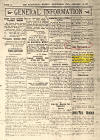
|
12 January
1929.
The
Bluefields Weekly, p. 2.
". . . We beg to
remind the President that the Coast with
about 30,000 inhabitants paid, in 1927,
$962,203.58 in Custom Dues, while the
Interior with about 600,000 inhabitants
paid only, in comparison, $2,155.887.42.
This therefore proves that, with the
excise taxes on tobacco and aguardiente
and capital tax on farms, the banana
industry is already indirectly
overtaxed."
|
|

|
14 January
1929 (1700).
Radiogram from CO
Northern Sector, Bocay, to Capt.
M. A. Edson, Poteca.
"TWO RATION BOATS
WITH THREE MARINES LEFT FOR POTECA TENTH
STOP YOUR SMALL BOAT LEFT HERE ELEVENTH
WITH NATIVES HIRED BY WEBSTER FOR YOU"
|
|
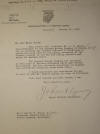
|
14 January
1929.
Letter from USMC
Major General Comandant John A. Lejeune,
Washington D.C., to Major H. H. Utley,
Puerto Cabezas.
"My Dear Major
Utley: ¶ This letter will
introduce Mr. M. B. Huston,
Vice-President of the Tonopah Mining
Company of Nevada, who is visiting with
the eastern district of Nicaragua in
connection with some of the mining
interests of the Company located in the
Pis Pis mining district and along the
Banbana River. ¶ The Tonopah
Mining Company has furnished us with
maps of Eastern Nicaragua which have
proven very useful, and has otherwise
cooperated in furnishing information
regarding conditions there. ¶
I would appreciate any courtesies you
may be able to show Mr. Huston during
his stay in Nicaragua. ¶
With kind regards and best wishes, I am,
¶ Very Sincerely yours, ¶
Major General Commandant."
|
|
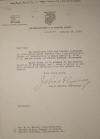
|
14 January 1929.
Letter from USMC
Major General Comandant John A. Lejeune,
Washington D.C., to Mr. M. B.
Huston, Vice-President, Tonopah Mining
Company of Nevada, Philadelphia PA.
|
|

|
16 January 1929 (1400).
Radiogram from CO
Marines, Garrobo, to Major H. H.
Utley, Puerto Cabezas.
"GARROBO PATROL TO PASO REAL DE CUA IS
OVER DUE STOP REQUEST AIRPLANE
RECONNAISSANCE OF TRAIL STOP PATROLS
MISSION WAS TO BRING IN TWO NATIVES
KNOWN TO BE GIVING INFORMATION TO
BANDITS AND TO BRING IN THE BODY OF
CORPORAL WILLIAMSON STOP MATTESON
CLEARED FOR BOCAY AT THIRTEEN THIRTY
STOP 1400"
|
|

|
17 January 1929 (1130).
Radiogram from
Major H. H. Utley, Puerto
Cabezas, to Gen. Feland, Managua.
"RELIABLE REPORTS
HERE INDICATE SITUATION NORTHERN COAST
ACUTE ESPECIALLY AT CEIBA STOP AMERICAN
CONSUL CEIBA HAS INQUIRED IF WARSHIP IS
AVAILABLE AND STATES HE MAY REQUEST
WARSHIP AT ANY HOUR STOP COULD MUSTER
EQUIVALENT OF ABOUT ONE COMPANY
BLUEFIELDS AND HERE FOR EXPEDITIONARY
SERVICES IF NEEDED 1130"
|
|

|
17 January
1929 (1230).
Radiogram from
Major H. H. Utley, Puerto
Cabezas, to Gen. Feland, Managua.
"PATROL FROM
GARROBO RECONNOITERING QANOD EL DIABLO
[CAÑON DEL DIABLO?] IN VICINITY OF
BOCACITO AND PASO REAL DE CUA AREA STOP
BODY OF CORPORAL WILLIAMSON RECOVERED
ONE MILE FROM ZAPOTE STOP ONE CRUZ
GARCIA IN BANDIT EMPLOY CAPTURED AND THE
CAPTURE OF JESUS PICADO EXPECTED STOP
PATROLS RETURN EXPECTED ABOUT THE
TWENTIETH STOP 1230"
|
|
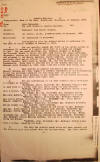
|
1.
17 January 1929.
Complaint from Puerto Cabezas, with
Statements of Witnesses, Area Commander
Major A. B. Sage,
Bluefields, to the Jefe Director GN,
Managua, p. 1.
""Reference:
(a) Letter, JD.GN., 3-TJM-14-dated 27
December, 1928. ¶ Enclosures: (8)
Statements of witnesses. ¶ 1.
Investigation into the subject matter of
reference (a) was made at Puerto Cabezas
on January 9, 1929. ¶ 2. The one
specific charge set forth in the letter
quoted in reference (b) relates to a
native being tied to a horse and dragged
to jail. The two names mentioned are,
Sergeant Dougald K. McGregor and
Corporal Buddie L. Booth, who were both
during the times mentioned, September,
October and November 1928, performing
duty as Military Police and attached to
the Marine Barracks, Puerto Cabezas.
During the period mentioned there was an
officer of the Guardia Nacional
stationed at Puerto Cabezas, Cadet Clyde
R. Darrah, GN., who was performing duty
as Commandante. There were no enlisted
men of the Guardia Nacional at Cabezas
until November 8, 1928, when three men
joined from Cruta, Nic. ¶ 3. Upon
arrival at Cabezas information was sent
out to Macario Estrada and other signers
to present themselves at the
Commandancia. Of all the witnesses
examined the following were the only
ones to definitely state their presence
as eye witnesses to the abuses
mentioned. Their statements were taken
down under oath. ¶ 4. For the
information of the Jefe Director their
testimony is briefed as follows: ¶
‘CASTRILLO, David, witnessed Sgt.
McGregor taking a man to jail tied to a
horse, also Cpl. Booth using the same
methods. ¶ ‘ESTRADA, Macario, witnessed
Sgt. McGregor strike a man with a
bottle, breaking his nose. ¶ ‘MC DONALD,
William, witnessed Sgt. McGregor strike
Emiliano Acevedo, tie him with a rope,
drag him alongside of a horse. ¶
‘MENDOZA, Manuel, witnessed Sgt.
McGregor strike a man with a bottle,
breaking his nose. Witnessed Cpl. Booth
strike Edgardo Robsetto while mounted on
a horse. ¶ ‘MONGALO, Francisco,
witnessed Sgt. McGregor mistreat Felipe
Donair and two negroes, names unknown. ¶
‘MORA, Ramiro, states he was struck by
Sgt. McGregor, saw Cpl. Booth strike a
man (Columbian) name known, witnessed
Sgt. McGregor strike Emiliano Acevedo
and tie him to a horse by the neck. ¶
‘MORA, Octaviano, states he was struck
by Cpl. Booth, witnessed Cpl. Booth
strike a man (Columbian) name unknown,
witnessed Sgt. McGregor strike Emilian
Acevedo, tie him to a horse and drag him
along the ground. ¶ ‘SANDINO, Jose,
witnessed Sgt. McGregor strike a man
with a bottle, breaking his nose. ¶ 5.
The only two persons named above who
were present and who claim to have been
abused were the brothers Mora. The other
native . . . "
|
|
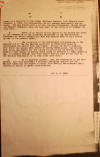
|
2.
17 January 1929.
Complaint from Puerto Cabezas, with
Statements of Witnesses, Area Commander
Major A. B. Sage,
Bluefields, to the Jefe Director
GN, Managua, p. 2.
" . . .
named in a majority of the cases,
Emiliano Acevedo, left Cabezas about
December 1, 1928, for Prinzapolka and
his present whereabouts are unknown. The
man struck with a bottle, the man
(Columbian), Felipe Donair and Edgardo
Robesetto, have not been seen in the
vicinity of Cabezas for some time. ¶ 6.
There is no record of any report of the
abuses set forth in the statements of
the witnesses being made to the
Sub-Division Commander at Puerto Cabezas
nor were any reports made to this office
by any of the persons named. ¶ 7. The
authority of the undersigned not
extending to the examination of the two
Marines mentioned no steps were taken to
investigate the matter from this angle.
During the period however, over which
the abuses were stated as having taken
place, the natives were being registered
for the coming elections and as several
of the assaults were stated as having
taken place on November 4, 1928,
Election Day, it appears strange that
some report was not made at the time to
the Election Commission or to some other
authority. ¶ 9. It is apparent however,
from the Statements of the witnesses,
that they entertain a personal prejudice
against the two Marines named and the
degree to which this feeling has
affected their statements should be
given consideration. ¶ /s/ A. B. SAGE .
. . "
|
|
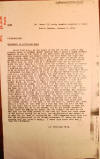
|
3.
17 January 1929.
Complaint from Puerto Cabezas, with
Statements of Witnesses, Area Commander
Major A. B. Sage,
Bluefields, to the Jefe Director
GN, Managua, p. 3.
Statement of Octaviano Mora, translation
from the Spanish original, Puerto
Cabezas, Jan. 9, 1929.
" . . . (m) (sheet (1) being Spanish
original of this) ¶ Puerto Cabezas,
January 9, 1929 ¶ (TRANSLATION) ¶
STATEMENT OF OCTAVIANO MORA
¶ About 7:00 p.m., on the night of the
5th of Nov., 1928, I was playing cards
in Antonio Bones’ Cantina when I heard a
fight between negroes in one of the
rooms of the same house the Cantina is
in. I stop playing cards and walked
toward the room where the fight was
taking place, when I was surprised by a
blow that the marine Booth gave me and
incontinent took out a gray whip that he
uses and struck me twice with it, that
left me a permanent scar one on the side
where the hair begins, a little above
the forehead, which is visible and the
other on the chin visible, after
striking me so without I giving any
cause he searched me and as he did not
find anything on me he kicked me outside
the house on the street. Some days
before I witnessed the same marine Booth
go to Sagundo Moreno’s house about 6:00
p.m., accompanied by a negro, and told
Moreno that if he did not pay the negro
what he owed him, he was going to take
him to jail and as Moreno said that he
would not pay him because he had no
money and to do as he pleased, he beat
him to his desire. I also witnessed
Booth go in a Barber Shop a Sunday about
4:00 p.m., and search a Colombian negro,
whose name I do not know, as he did not
find anything on him, he put on a glove
and struck him a blow on the face
knocking him down without being able to
say a word. About 4 days later after I
was beaten up, I also witnessed Sgt.
McGregor strike Emiliano Acevedo in the
following manner; Acevedo saw his woman
Amalia de Acevedo was in his house,
maybe he had scolded her, he was going
home somewhat displeased, for which she
screamed, appearing Mc. at the moment
and striking Acevedo on the face and
incontinent he took out his gray whip
which they call black jack and struck
Acevedo on the back of the ear with it.
Acevedo fell down without a word, he
then took out a rope and tied him with
one end the other and he tied to the
saddle and he arrange to drag him and
maybe carry him so on the street, but at
the moment Acevedo’s woman cried out
asking for mercy, for her husband and
what Mc did was jeer her and drag
Acevedo to the bush and leave him there
where he was without moving for an hour,
the neighborhood was afraid to go near
him for fear of irritating Mc. This
happened about 3:00 p.m. and the
neighborhood of Old Bilway witnessed it,
among who were Antonia Bone and Bravo’s
family. I state this under oath and I
sign for constancy. ¶ /s/ Octaviano Mora
. . . "
|
|
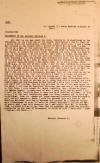
|
4.
17 January 1929.
Complaint from
Puerto Cabezas, with Statements of
Witnesses, Area Commander
Major A. B. Sage,
Bluefields, to the
Jefe Director GN, Managua, p. 4.
Statement of Mr.
Macario Estrada R., translation from the
Spanish original, Puerto Cabezas, ca.
Jan. 9, 1929. " . .
. (k) (sheet (j) being Spanish original
of this) ¶ TRANSLATION ¶
STATEMENT OF MR. MACARIO ESTRADA R.
¶ All that he can say about the case,
because he is questioned in the
following: on the first day of the
passed inscription I was in front of a
place where the inscription table was,
about 10:00 a.m., I saw a young man
walking on the street with a bottle of
water in his hand, he was called by a
Sgt. of the American Force in this place
to investigate maybe, if what was in the
bottle was liquor, and when he found out
that it was water, he struck the lad a
blow, breaking his nose, from the blow
he fell to the ground. I do not know the
lads name. I do not see why Sgt.
McGregor struck him, he did not give any
reason, to strike him such a blow
knocking him to the ground and breaking
his nose; the lad was taken to the
Hospital by Mr. Jose de Jesus Sandino
for treatment. Furthermore in another
occasion while I was getting home, or in
other words, about 12:00 p.m., on the
4th of Nov. 1928, I saw the Sgt. talking
to a colored woman, and as I did not
notice him as I passed, he called me
three times in a loud tone of voice, and
until the 3rd time I look back, he said
to me in a coarse voice, why did you not
tell me goodbye? I told him that I did
not think it necessary, McGregor took
out his revolver but he did not
discharge it, then for prudence I went
in a house and got out through the other
side to avoid him seeing me. I can say
too that said Sgt. more than once had
struck iniquitously many Nicaraguans
without a cause, to such an extreme as
to sling them with a rope by the neck
with a rope and tie the same to the tail
of a mule that he use to ride and start
off running, forcing the prisoner to run
at the same speed as the mule. I can
name Mr. Francisci Gonzalez, who was one
of the offenders in that form. I also
recall Mr. David Castrillo, Mrs. Helena
de Lopez and Haydes Zapata, to make sure
of what I have said, and as proof to
indicate the Sgt. behavior that he have
had with American citizens, in this
place. I do not omit manifesting that
for those reasons and to save my
co-National, from the coarse and
iniquitous maltreatment for McGregor’s
part and his companion Booth I made the
protest that was sent to the American
Minister residing in Managua and invited
in a reserved manner such Nicaraguans to
sign, in order to obtain McGregor’s
relieve as Sgt. of guard, and I say this
reserved for I was afraid that Mc. in
knowing this, he would hit me in the
form that he accustoms and with arm
entirely prohibited by the laws of
Nicaragua. In faith of what I had said I
sign – Tested – No Vale -----. ¶ Macario
Estrada R . . . "
|
|
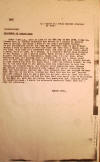
|
5.
17 January 1929.
Complaint from Puerto Cabezas, with
Statements of Witnesses, Area Commander
Major A. B. Sage,
Bluefields, to the Jefe Director GN,
Managua, p. 5.
Statement of Ramiro Mora, translation
from the Spanish original, Puerto
Cabezas, ca. Jan. 9, 1929.
" . . . (i) (sheet (h) being Spanish
original of this) ¶ (TRANSLATION) ¶
STATEMENT OF RAMIRO MORA
¶ After 7:00 p.m., more or less of the
5th day of Nov 1928, I was informed that
my brother Octaviane was struck by a
marine in Antonio Bone’s Cantina, for
which I went to the aforementioned
Cantina to get information but that the
time Sgt. McGregor came up and without
saying a word he struck me with his and
then with a black jack on the head, that
left me a permanent scar, and made me
spit blood. About a month, more or less,
on a Sunday, in a creole’s Barber shop
situation on Old Bilway, I saw a marine
named Booth strike a colored man with a
glove (the man was a Colombian), whose
name I do not know, after searching him,
not finding even a penknife, without a
cause. About four or five days after
striking me, I witnesses Sgt. Mc strike
Acevedo he also struck him with the
black jack, left him without breath, he
tied him by the neck then to the saddle,
with the intentions to haul him through
the streets maybe, but shortly after
beginning such inhuman and savage
intention, Acevedo’s wife begged for
mercy, desisting Mc. from his
intentions, jeering her, then loosened
him, and dragged to some bush that was
on one side, telling her that that was
his bed. Acevedo was left without able
to say a word for an hour, more or less,
and none of the neighbors could aid him
for fear that they would also be
maltreated by the said Mc. such was the
horror that mentioned Sgt. inspired
among the neighborhood. I state the
aforesaid statement under oath and I
sign for constancy. ¶ RAMIRO MORA . . .
"
|
|
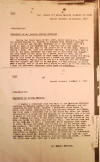
|
6.
17 January 1929.
Complaint from
Puerto Cabezas, with Statements of
Witnesses, Area Commander
Major A. B. Sage,
Bluefields, to the
Jefe Director GN, Managua, p. 6.
Statements of Mr.
Daniel William McDonald and Manuel
Mendoza, both translated from the
Spanish, Puerto Cabezas, Jan. 9-10,
1929. " . . .
Puerto Cabezas, 10 January, 1929. ¶
(TRANSLATION) ¶ STATEMENT OF MR. DANIEL
WILLIAM McDONALD ¶ During the first days
of Nov. 1928, about 4:00 p.m., I was in
the BILWAY TRADING CO. CANTINA in
company with several friends, in the
interior and saw Sgt. McGregor go to the
front part of a house in back of the
CANTINA and I saw him hit a man namely
Emiliano Acevedo who fell to the ground
as if he was dead, without saying a
word; Mc. left and returned shortly,
tied Acevedo with a rope by the neck,
fastened the other end to his horse and
dragged him from where he was lying for
8 yards, more or less, but then loosened
him at the request of some woman who
were crying for mercy, half an hour
later he returned and I asked him what
had happened and he answered, saying
that he had hit a Spaniard (as the
Nicaraguans are called) and that if he
was dead, it was nothing, he would make
a report, and if he was still alive he
would go to the Hospital. I sign the
aforesaid statement under oath of a
constancy. ¶ Puerto Cabezas, January 9,
1929 ¶ (TRANSLATION) ¶ STATEMENT
OF MANUEL MENDOZA. ¶ I signed a
complaint that was sent to the American
Minister residing in Managua against the
American Sgt. McGregor and his companion
by name Booth, because I witnessed three
cases in which both struck indecorous
and iniquitously several nationals, the
first case I witnessed was on the first
day after the passed inscriptions, a
young man was walking on the street with
a bottle of water in his hand that was
snatched from him by McGregor, who after
finding out that it was water struck the
lad a blow on the nose and broke his
nose, and made him roll. The second case
was on the 11th day of Nov., I witnessed
Booth whipping from right to left,
driving his horse that he was on, on the
people that was present. The other case
that I witnessed was on the night of the
4th of Nov., when Booth had a man by
name Edgardo Robleto running, driving
his horse on him and whipping him,
without opposition on Edgardo Robleto’s
part, furthermore by references I know
that broke Mr. Edmundo Sandoval’s head
and that Mc. iniquitously struck Felipe
Donaire, both without any cause. I state
the afore case under oath and I sign for
constancy. ¶ /s/ Manuel Mendoza . . . "
|
|
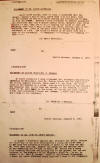
|
7.
17 January 1929.
Complaint from Puerto Cabezas, with
Statements of Witnesses, Area Commander
Major A. B. Sage,
Bluefields, to the Jefe Director
GN, Managua, p. 7.
Statements of Mr. David Castrillo,
Doctor Francisco S. Mongalo, and Mr.
José de Jesús Sandino, all translated
from the Spanish, Puerto Cabezas, Jan.
9-10, 1929. " . . .
(TRANSLATION) ¶ STATEMENT OF MR.
DAVID CASTRILLO. ¶ About three
months, more or less, I witnessed Sgt.
McGregor, taking a man to jail, whose
name I do not know, tied by the throat;
he was on a horse running and forcing
him to keep up with the horse. Bedsides
I have witnessed in several occasions
the mentioned Sgt. and a marine namely
Booth, whenever they bring anyone to
jail they use to do it running the horse
on them and whipping them with a whip or
with the reins, forcing them to run;
everybody that lives on the main street
of Bilway can give a statement of time.
The afore is stated by me under oath and
I sign it for constancy. ---- Enmanded
---- Coming ---- Coming ---- Vale ---- ¶
/s/ David Castrillo ¶ Puerto Cabezas,
January 9, 1929 ¶ (TRANSLATION) ¶
STATEMENT OF DOCTOR FRANCISCO S.
MONGALO ¶ In three occasions I
have witnessed Sgt. McGregor maltreating
inhumanly Co-Nationals, once Mr. Felipe
Donair and two times more two little
negroes creoles, whose name I do not
know, the three times he was mounted on
a horse, that he was driving on the
prisoner and whipping them to let them
run briefly on the streets, in other
words at the same speed as the horse, so
the man get less lashes. I find this
procedure illegal and inhuman. I state
this under oath and I sign it for
constancy. ¶ /s/ FRANCISCO S. MONGALO. ¶
Puerto Cabezas, January 9, 1929. ¶
(TRANSLATION) ¶ STATEMENT OF MR.
JOSE DE JESUS SANDINO ¶ I
signed a statement against Sgt. McGregor
and Booth, because the first day of the
last inscriptions a young man whose name
I do not know was carrying 2 bottles of
water in the hand and Sgt. Mc. took them
from him, because the young man was
smiling while he was examining the
bottles of water. Mc. struck him a heavy
blow breaking his nose and hitting him
to the ground; the lad was conducted to
the Hospital of the Bragman’s Bluff Co.,
by me, by orders of Dr. Luis P. Acevedo,
Chief of the Liberal Propaganda. I state
the afore statement under oath and I
sign it for constancy."
|
|
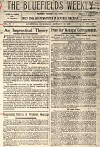
|
1.
19 January 1929.
The
Bluefields Weekly, p. 1.
"AN IMPRACTICAL
THEORY ¶ From time to time, in some way,
the smoldering fires of feudalism
between the Coast and the Interior are
fanned by some ignorant enthusiasts.
Sometimes they are fanned by the Coast
by a tribal selfishness, asserting that
no government official should be sent
from the Interior to occupy government
positions on the Coast. Why not? Are not
the people of the Interior Nicaraguans?
¶ But we admit that during the
Conservative administration of the
government a lot of carpet-bagger
officials were purposely sent here to
make money, and to make it any way; so
some of them made it on short order by
high handed graft. The public knows
them, therefore it is not as necessary
to be personal by citing their names. ¶
What should be exacted by the people of
the Coast, in regard to officials
appointed from the Interior, is that
whenever any is to be sent from there
the appointee should be a man with a
sense of honor and dignity as
complements to his competency. ¶ The
Interior fans the fire by directly
depriving the Coast by taking away all
the surplus revenues instead of spending
some here for tangible civic
improvements, and by levying an export
tax on bananas,--unprofitable business
from which the people make their
livelihood with much hardship; and the
interest by which the politicians of the
Interior want to further fan the fire is
the fantastic idea of trying to suppress
the English schools here, expecting that
by so doing they will quickly
nationalize the Creole of the Coast. ¶
To nationalize the Coast by the
suppression of the English schools in an
impractical theory engendered in the
mind of an ignorant enthusiast. ¶ It is
too late to check the English language
in this part of Nicaragua. A child first
learns its mother’s tongue, and coupled
with the fact that the Nicaraguan canal
will be American property-Americans
speak English—it is a physical
impossibility to suppress English in
Nicaragua. ¶ We take pleasure to suggest
that Spanish should be a compulsory
subject, taught (by) qualified
professors, in our denominational
schools of foreign tongue. It is to the
advantage of the child, the future
citizen, that it speaks the language of
the country’s courts of law, apart from
the fact that to be proficient in two
languages is a scholarly embellishment."
|
|
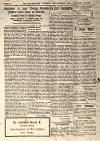
|
2.
19 January 1929.
The
Bluefields Weekly, p. 2.
" . . . The full
text proceeds: ¶ On December 2, 1924,
new agreements were signed , with the
approval of the Department of State,
between the bankers and Nicaragua. As
late as November 1914 the bankers had
refused to extend further loans to
Nicaragua because of their fear that the
maximum credit point had already been
reached. The Government, however,
enacted legislation creating a direct
tax upon capital, and the bondholders
under the Ethelburga loan agreed to a
temporary suspension of payments
pursuant to the agreement of March 1912.
Nicaragua released the bankers from the
obligation to loan $500,000 for railway
extension and the bankers therefore
postponed for a period of four months
(26) the payment on the Treasury bills
maturing under the October 1913 loan. In
granting these extensions it was
understood that the bankers would be
reimbursed from the canal treaty funds
when received. The bankers extended an
option previously given to resell 51 per
cent of the railway shares to the
Nicaraguan Government at the original
purchase price of $1,000,000 plus 6 per
cent interest, until April 1, 1915; the
bankers agreed that the National bank of
Nicaragua might place in circulation an
additional 1,000,000 cordobas to be used
exclusively for loans on products for
exportation; the National Bank was
authorized to pay its deposits with its
own notes ; and finally, an additional
currency issue of $500,000 was
authorized for the payment of the
budgetary obligations of the Government,
including salaries, these notes to be
guaranteed by a first charge on the
proceeds from the tax on capital. The
entire arrangement was subject to change
should the Bryan Chamorro treaty (27) be
ratified and Nicaragua receive the
$3,000,000 payment under the treaty. It
was anticipated that the treaty would be
ratified during the period on the
suspension of the bond and Treasury bill
payments. ¶ 24.--See Foreign Relations
of the United States, 1913, pp. 1061 et
seq. ¶ 25.—Ibid, 1914,pp. 944 et seq. ¶
26.—This was subsequently extended to
January 1, 1917. ¶ 27.—Six different
treaties were negotiated between the
United states and Nicaragua regarding an
interoceanic canal during the nineteenth
century. (To be continued)."
|
|
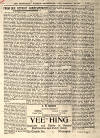
|
3.
19 January 1929.
The
Bluefields Weekly, p. 3.
"FROM
OUR DETROIT CORRESPONDENT ¶ The
earnestness with which the president and
the president elect of Nicaragua urged
Mr. Hoover to make an early start on the
Nicaragua canal is a hopeful sign. A
decade and a half ago the United States
obtained by treaty “The exclusive
proprietary rights necessary and
convenient for the construction
operation and maintenance of an
interoceanic canal” construction across
Nicaragua. The treaty left the details
of construction, operation and
maintenance to be agreed upon by the
government of the two contracting
nations. This would make it possible for
a Nicaraguan or North American
government unfriendly to the Canal to
delay its construction indefinitely. The
assurances volunteered by president Diaz
and president-elect Moncada remove al
fear of objections to the Canal being
raised during their administrations, and
it can certainly be accepted as a fact
that Mr. Hoover gave the same positive
assurance the incoming administration,
of which he will be the head will be
very friendly to the canal. Whether the
time has come for the United States to
parallel the Panama Canal with another
Isthmian ditch is a matter of opinion.
Unquestionably it will have to do so
eventually. The annual report of the
governor of the Canal zone shows that
the 1928 transits were 18% above those
of 1927, and that the Panama Canal is
now being used to 45 or 50 per cent of
its present capacity. Governor Walker
believes that this capacity can be
enlarged by constructing another flight
of locks and developing a supplementary
water supply. When this has been done
the utmost capacity of the Panama Canal
will have been reached. As it will
probably take ten or twelve years to
complete a Canal across Nicaragua, there
are some experts who think that work on
it cannot be begun too soon. That is a
question which Mr. Hoover’s engineering
and economic training fit him to answer;
and very likely he will address himself
to the study of it early in his
administration. The abroad hint given by
President Diaz and president-elect
Moncada presumably will not be forgotten
when he sees an auspicious time for
opening negotiations regarding details
of the project. . . ."
|
|

|
4.
19 January 1929.
The
Bluefields Weekly, p. 4.
|
|
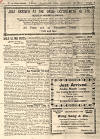
|
5.
19 January 1929.
The
Bluefields Weekly, p. 5.
"SALE ULTRA VIRES
¶ Bluefields, Nicaragua, January 17,
1929. ¶ My dear sir, ¶ As President of
the Foreign Building commission. The
fifty acres of land at the Bluff which
you purchased from the government of
Nicaragua and for which was paid seven
thousand dollars ($7,000) to erect
thereon a building to be used for the
American Consulate is located near the
entrance in Bluefields Lagoon and is
Ultra Vires as said transaction is in
violation of the land laws of Nicaragua.
¶ Agrarian Law. Chapter 1.—First section
Art. 2.—The ownership of the Nation over
unappropriated lands is transmissible by
conditional title (título oneroso)
or gratuitous to Nicaraguans or
foreigners, as long as such lands are
not destined for new towns, roads,
ports, arsenals, parks, gardens or any
other objects of public utility. ¶ There
cannot be appropriated: Lands
comprised in a zone of two kilometers of
latitude along the shores of both
oceans; and the side of lakes and
navigable river in a latitude of eight
hundred metres; and the islands in
territorial waters and lakes; but the
reserved zone on the southeast side of
lake Nicaragua, from the Las Lajas River
to the Tule, and on each side of the San
Juan River, shall be three thousand five
hundred metres. Neither can be
appropriated lands comprised in a zone
of five kilometers in width along the
frontier line with the Republic of
Honduras. ¶ The contemplated location is
nearly a mile from the Custom House at
the Bluff and would require the
construction of a road to go to the
Consulate. ¶ The site is better adapted
for military use, as in case of
political disturbance, it commands the
entrance to the harbor. ¶ I understand
that the house will be concrete—which
any sensible person knows is not
appropriate for this country of rain and
humidity. ¶ Cement costs here eight
dollars ($8.00) a barrel and is used
only for pavements and blocks as
foundation of buildings. ¶ There are
just two buildings of cement in
Bluefields, and during the rainy
season—from May to December—downpours
within same prevails. ¶ You got mixed up
on this question while you were at
Managua—as there and in the other towns
of the Interior the dwellings are
constructed from adobe-and are free from
dampness. ¶ I was just wondering if the
price of the land and cost of
construction come from your personal
funds if you would be so extravagant in
buying fifty acres of land and so
generous in the size and cost of the
building. ¶ When Congress appropriates
one million dollars a year for the use
of the Foreign Building Commission they
naturally expect the members thereof to
exercise reasonable business care and
methods in the purchase of land and cost
of construction of buildings—Did you
ever give a thought to the fact that
with the Consulate at the Bluff where
will the vice-Consul and Consular clerks
reside? ¶ Copies of this are forwarded
to the other members of the Committee. ¶
Sincerely. ¶ M. J. CLANCY"
|
|
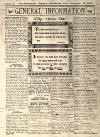
|
6.
19 January 1929.
The
Bluefields Weekly, p. 6.
"CHANGE OF
COMMANDER OF THE EAST ¶ On Saturday last
Major Roger Beard arrived on the motor
schooner Linda S. from Colon. He is
successor of Major A.B. Sage who is
relieved as Area Commander. Area of the
East, Guardia Nacional. ¶ In the near
future Major Sage will leave Bluefields.
We know the arduous tasks he endured to
organize, with recruits previously
pampered by the ease of the tropics, the
Guardia Nacional in this Area. He goes
with the very best wishes of The
Bluefields Weekly."
|
|
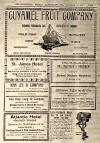
|
7.
19 January 1929.
The
Bluefields Weekly, p. 7.
[page of
advertisements]: "CUYAMEL FRUIT COMPANY.
GROWERS, PURCHASERS AND EXPORTERS OF
BANANAS. RFEGULAR FREIGHT AND PASSENGER
SERVICE BETWEEN NEW ORLEANS CIENFUEGOS
BLUEFIELDS. ¶ ST. JAMES HOTEL. Most
Up-to-date Establishment of its kind in
the City. ¶ CASA DE SALUD OF DRS.
BRAYSHAW & BRAYSHAW. ONLY MODERN METHODS
EMPLOYED. ¶ MAN LEE & COMPANY, Willie
Siu, Manager. Wo Hound Siu, Sub-manager.
Importers and Dealers in General
Merchandise and Fancy goods. ¶ ALFONSO
UGARTE & CO. WATCHMAKERS AND JEWELERS.
MERCHANTS COMPLETE STOCK OF GOLD AND
SILVER ARTICLES. ¶ SUN HING LONG &
COMPANY. IMPORTERS AND EXPOERTERS.
WHOLESALE DEALERS IN GENEAL MERCHANDISE
CHINSE AND JAPANESE GOODS. JUAN FONG,
Manager. ¶ ATLANTIC HOTEL, Centrally
situated. Excellent board & well
ventilated rooms. ¶ Gaille Outboard
Motor. See the new GAILLE Before you
Buy!"
|
|
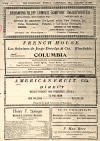
|
8.
19 January 1929.
The
Bluefields Weekly, p. 8.
[page of
advertisements]: "¶ BRAGMANS BLUFF
LUMBER COMPANY, INCOPORATED. Oficina
principal: Union Indemnity Bldg.-- NEW
ORLEANS, LA. Servicio de pasajeros (De
Luxe) entre New Orleans, La. Cuba,
Honduras, Panama y las Indias
Orientales. BANANOS. MADERAS DE PINO
AMARILLO. John McKay,--Gerente. Division
de Nicaragua.—Puerto Cabezas, Nic. ¶
FRENCH HOUSE. Los sobrinos de Jorge
Dreyfus & Cia. Bluefields. Agency Only
distributors: COLUMBIA. RETAILED IN
BLUEFIELDS BY: Alfonso Navarro, Alfonso
Ugarte, Ernesto Rivera, Economical Drug
Store. Hugo R. Gross in Prinzapolka
Bilway Trading Company in Puerto
Cabezas. Ask for the new COLUMBIA VIVA
TONAL . (Life Tone) Large assortment of
COLUMBIA RFECORDS The latest pieces
engraved by electrical method. ¶
AMERICAN FRUIT CO. DIRECT. WEEKLY
FREIGHT AND PASSENGER SERVICE TO AND
FROM NEW ORLEANS BLUEFIELDS Exporters
and Growers of Bananas. ¶ HENRY F.
SPRINGER. Wholesale & commission
Merchants. Bluefields, Nicaragua.
REPRESENTING; Nestle & Anglo Swiss cond.
Milk & Confectionery. E. Greenfields &
sons, Brooklyn. N.Y. Candies. Patron &
Paint works, Brooklyn, N.Y. Paints.
Friedman Shelby shoe co., St. Louis, Mo.
Shoes. Kermath Manufacturing co.,
Detroit, Mich. Motors. Columbian
enameling & Stamping co. Terre Haute,
Ind. Enameled Ware. Oklahoma city Milk
&Elevator co. Oklahoma city, Okla.
Flour. Herbert Dickinson, Ltd.,
Hudderfield, England, woolen Goods. J.
H. Morris co., Ltd. New Orleans, La.
Wooden Ware and etc. Jos. Levy & Bros.
co., New Orleans, La. Stationery. Parker
Blake co. Ltd, New Orleans, La. Drugs.
Liberty Oil co. , New Orleans, La. Oil
Producgts. Vahies Baking
Company..biscuits & crackers.
Vacher-Green inc. New Orleans, Vacher
Remedies. ¶ R.H. HOOKER, Bluefields,
Nicargua. Manufacturer of fine
furniture, Building Contgractor. UP – TO
DATE EQUIPMENT BEST WORK GUARANTEED. ¶
F. MAX. BEER CUSTOMS BROKER AND
FORWARDING AGENT (ESTABLISHED 1911)
Bluefields Bluff Nicaragua"
|
|
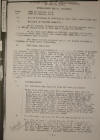
|
21 January 1929.
Intelligence Report, Periodic, 13-19
January, Major H.
H. Utley, Puerto Cabezas, p. 1.
"Map: Map of
Nicaragua by Clifford D. Ham, 1924,
scale 1/600 000. ¶ 1. LOCATION OF
HOSTILE ELEMENTS. ¶ On 17 January,
Brigade reported 50 bandits passing
through SANTA ISABEL headed south on
16th and 8 headed for PAVVONA. ¶ On the
same date Edson at GUIGUILI reported
that native prisoner at SANTA CRUZ
stated Altimirano near COCO River
heading to join Sandino near Chipote. ¶
All other sectors reported quiet with
number of natives returning to their
homes increasing. ¶ 2. POLITICAL
SITUATION. ¶ The political situation
along the northern coast of Honduras was
reliably reported acute, especially in
vicinity of Ceiba. It is believed,
however that there will be little or no
trouble if the Honduran Congress puts
the Reds in power. Leaders who are now
Blue seem willing to become Reds if
given a good job under the new
government. The Commandante at La Ceiba
has 171 well armed and fairly well
disciplined men. General Ferrera has a
small force of Indians about 20
kilometers from San Pedro Sula. It is
rumored on good authority that both
Parties have been making efforts to
secure gas but it is believed their
efforts so far have been unsuccessful.
It is also rumored that the president of
Mexico has broken with General Calles
and is strongly anti-American, but that
Mexico is not at present supplying money
to agitation leaders in Central America.
The Fruit Companies are depending on the
American Government for protection in
case of trouble. ¶ 3. MISCELLANEOUS ¶ a.
The following was received from CO
Northern Sector: ¶ ‘8601 Your 8628 dash
1610 True conditions this vicinity among
natives as follows shortage exists
certain articles food such as beans
comma corn comma rice comma beef and
fowls said due to Sandinista activities
last Spring stop This vicinity said to
have been stripped those articles that
time by bandits stop. Appears to be
abundance [with] food viz bananas and
other fruits fish and game stop Soon to
be few calls for other articles food at
local cantina here though most men
working and have money stop No evidence
anything resembling state starvation and
season for gardening close stop. Amount
sickness said to be average and none due
to malnutrition stop 1800’ ¶ b. The
following was received from Captain
Linscott at Cuvali: ¶ ‘The wife of Juan
Francisco Salgado of ALO was, last Mon.,
undergoing her monthly ‘illness’ when an
airplane passed over her home. It being
her first sight of such a monster, she
was so frightened that her ‘illness’
ceased, she has not been ‘ill’ since, is
now pregnant and holds the plane and
pilot responsible. Another ‘immaculate”
conception!’ . . . "
|
|
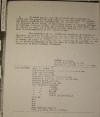
|
21 January 1929.
Intelligence Report, Periodic, 13-19
January, Major H.
H. Utley, Puerto Cabezas, p. 2.
" . . . 4. It
would appear that the movement into
Chontales is either for the purpose of
increasing the area in which the bandits
can gather supplies and possible support
and thereby relieve our pressure in the
north, or that those bands, not finding
affairs in Honduras to their liking, are
seeing refuge in Costa Rica. If the
latter is true, and I consider it more
probable, it is a further sign of
disintegration of the bandit forces. ¶
The situation in the contiguous
territory of Honduras is important in
that if trouble breaks out one party or
the other is almost certain to seek
alliance with Sandino, and we may be
compelled to weaken our force to provide
for the protection of American property
and lives in Honduras as was the case in
Haiti in 1916 when the occupation of
Santo Domingo commenced. ¶ HAROLD H.
UTLEY, ¶ Major, U.S. Marine Corps, ¶
Commander, Eastern Area, Nicaragua."
|
|
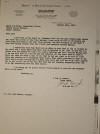
|
22 January 1929.
Letter from H. T.
Coe, Bragmans Bluff Lumber Co.,
to Major H. H. Utley, Puerto Cabezas.
"Dear Sir: ¶ I have been on the wharf in
Bragmans Bluff for the past twenty-eight
months and since the arrival of the
first Marines I have tried my best to
cooperate and work along with them to
the best of my ability, but here
recently on the wharf I have been having
trouble with one of your dock sentries
Private Musick. ¶ I understand that when
there are no ships in port that no one
is allowed on the wharf and I quite
agree with that, but on Saturday 12th,
inst. we had the S.S. Waunta also two
banana bit boats vis. Schrs. Esfuerso
and Star. Private Musick came to me and
said that if I did not get the labors
off the wharf that he himself would put
them off which I fail to see that he had
any right to do this as I had these men
standing by to discharge these boats.
Then again yesterday he came on the
wharf while we were loading the S.S.
Wawa with fruit and told one of my fruit
inspectors to get to hell out of his
way. Now this man was standing
inspecting fruit and in no way
interfering with the dock sentry. ¶ I am
asking you to please advise Private
Musick to mind his own business while on
the wharf. ¶ Thanking you. ¶ I beg to
remain, ¶ Yours truly, ¶ H. T. Coe Jr."
|
|

|
25 January 1929 (1212).
Radiogram from
Gen. Feland, Managua, to Major H.
H. Utley, Puerto Cabezas.
"WHENEVER
DEFINITE INFORMATION IS AVAILABLE YOU
ARE AUTHORIZED TO PATROL TO CRUTA
INTERMITTENTLY TRANSMITTING INFORMATION
RECEIVED PROMPTLY PERIOD NO REPEAT NO
DRASTIC ACTIONS ADVISABLE EXCEPT IN
EMERGENCIES PERIOD IN CONNECTION WITH
SCHOONER HAVE YOUR AIR SERVICE
RECONNOITER SACLIN AND VICINITY 1212"
[NOTE: Here Gen. Feland seems to tell Major
Utley to quietly break international law
& Honduran airspace and air-patrol the
Honduran side of the border to Cruta,
Honduras, north of Cape Gracias along
the coast.]
|
|
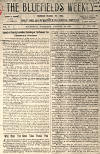
|
1.
26 January 1929.
"Speech of
Deputy Castellon, Debating on the Banana
Tax, Translation by Dr. Alfred Hooker."
The
Bluefields Weekly, p. 1.
"I have listened
attentively to the speech of
Dr.Sandoval, that opposes the project
law creating a tax of two cents on each
bunch of fruit that is exported, imports
destined to the benefit of the public
schools of the Atlantic Coast and to the
service of sanitation of the whole
republic. ¶ I am now willing to defend
the project in reference, not from
having any person of particular interest
in the matter, but that it leads to
welfare of all. ¶ It is an established
fact that taxes in general constitute
the foundation that guarantees the march
of any administration; and for this to
be efficient in its cause the revenues
must be proportionally levied and
figured on a just base. ¶ Money is one
of the dominant factors in government;
and to be deprived of same there would
be no provisions affording us the
necessary means of communication, roads,
railways etc. The good legislator uses
his common sense in harmonizing the
interest of key section of the country
with the interest of the whole nation. ¶
The coffee producing centres of Managua
and Carazo contribute greatly to the
revenues of the nation being taxed at
1.25 cents per quintal, seemingly rather
excessive. The same we must admit of the
different rich nature of sources of our
land, sugar, cattle, tobacco and other
things cultivated. ¶ The Atlantic
Coast of Nicaragua is the richest
section of the republic in which for
many years, the banana industry has been
prosperous, millions of bunches are
being exported year after year and
millions of dollars go in deposit to the
safes of the different corporations. ¶
The banana trade of the Coast is in the
hands of foreign enterprises that
cultivate large tracts of our precious
lands transforming them into banana
plantations. ¶ Native planters are
backed up in some way or the other by
these companies, providing them with
funds or other facilities to advance the
development of their properties, to
receive some time after enormous profits
in exchange of this apparent kindness to
them. ¶ Let us(?) (?) also that the
native planters in their minority
scarcely count with their own capital to
promote the industry of the fruit. The
companies, shipping out bananas to the
markets of the United States, get
favorable (?) their dealings, allowing
them thus to add occasionally heavy
profits to their investments. ¶ And
don’t forget that the foreigners are the
consumers that stand the tax and not the
Nicaraguans that sell the article.
Without further consideration, let us
all move in favour of our revenues. As
the South and Central American countries
are steadily increasing their incomes
from the collections of taxes on banana
exportation, and why should our
government remain without the aid of an
income that is just and compensated by
the constant use of our lands that are
daily decreasing in fertility? Our Coast
needs schools and sanitation. The
nationalization of the Coast would
practically be impossible without money,
neither would there be any possibilities
for schools, roads nor facilities for
trade. All our natural sources are taxed
and now the banana turn has come.
Neither administration nor progress can
(?) away without the support that taxes
afford. The products of the tax on
bananas will create a fund a part of
which is intended to remain on the
Coast. It is a question of necessity and
not an imposition taken. ¶ [Commentary
by Dr. Alfred Hooker:]
Why Bite The Hand That Feeds You.
¶ Demagogic rhetoric he influenced the
mind of his parliamentary colleagues to
vote on the banana tax which will in
time ruin the Nicaraguan planters only,
because certain foreign concessionaires
are exempted from this tax, and the
Creoles too, by virtue of the
Harrison-Altamirano Treaty, which
specifically states: the government
(Nicaragua) will submit to the National
Assembly a law exempting for fifty
years, from the date of the ratification
of this Treaty all the Mosquito Indians
and the Creoles born before the year
1894, from military services, and from
all direct taxation on their persons,
property, possessions animals and means
of subsistence. ¶ When the speech of
Senator Castellon is stripped of all its
verbiage it is readily detected that it
was invidiously aimed at foreign
capital, the hand that feeds us. ¶ In
sparring for his opening he stressed the
necessity for schools in an appealing
manner as if the country has no
appropriation for schools. This is
always a large sum, but heretofore a
large part goes for dummies. Now if
graft is checked in this appropriation
we will be able to get better schools
and equipment. ¶ He speaks of money as
the dominant factor for the successful
administration of government. Every
school boy knows this. But what about
the more than one million dollars a year
collected for duties and excise taxed
from the Coast with a population of
about 30,000 inhabitants? ¶ If Senator
Castellon wanted to be equitable in
respect to the Coast he would have
questioned how much is spent for civic
improvements after collecting such a
disproportionate sum, when the rest of
the country is considered. ¶ He
discussed about sanitation. Is not
Rockefeller, foreigner, helping us by
his generous munificence? And yet our
Senator directs his argument against
foreign capital. Why not see that
Congress refund the Municipality of
Bluefields its Custom Charges and see
that the funds are used for sanitation.
“The Atlantic Coast of Nicaragua is the
richest part of the republic”, he said.
Rich with what? Swamps and jungles,
yes—with plenty of mosquitoes, too. Will
Senator Castellon kindly let us know
which Nicaraguan from the Interior every
migrated from there to here and returned
o the Interior rich from honest
speculation. The Coast may be a better
field for the laborer, but never for the
business man. He further added,
“Millions of bunches of bananas are
being exported year after year”. Why did
he not consult a statistical record for
the exact figures? In 1927 the whole
country exported 2,386,191 bunches, much
less than 1925. Why did not Senator
Castellon question the reason the
exportation decreased? Why did he not
question” How is it Jamaica, a small
island which can hold in Lake Granada,
exported, in 1927 21 million bunches,
and after over 40 years cultivation
Nicaragua can only export 2 million? The
answer would be the Jamaica government
protects the planter and what he
produces. But the Nicaraguan government
tries to ruin the planter with tax when
he pleads for relief after a devastating
flood. ¶ Persuasively he convinced his
colleagues that the foreign investors
are making millions of dollars on their
investments. Where did he get his data
from to assert so authoritatively? ¶ We
are sure that the Bluefields Division of
the Cuyamel Fruit company is a drag on
the Company, because there is not enough
volume of business here to make money. ¶
We are sorry that for the want of space
we cannot make an exhaustive criticism
of the Senator’s speech, but we will
hint to him:--the secret of a country’s
prosperity is to put the people to work,
because a rich people make a rich
government. But never by tax, and more
tax."
|
|
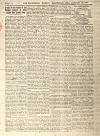
|
2.
26 January 1929.
The
Bluefields Weekly, p. 2.
|
|
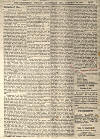
|
3.
26 January 1929.
The
Bluefields Weekly, p. 3.
|
|
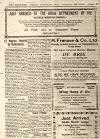
|
4.
26 January 1929.
The
Bluefields Weekly, p. 4.
"12
Negroes Honored for Achievements.
¶ Twelve awards aggregating $3,000 in
cash and medals in recognition of
outstanding creative work by negroes of
America in the arts, education, religion
and business were announced by the
Harmon Foundation with the opening of
the foundation’s yearly exhibit of fine
arts by negroes in International House.
The prizes constituted the third year
series of the Harmon Foundation’s awards
for distinguished achievement among
negroes. ¶ Archibald J. Motley Jr. ,
Chicago painter, won a gold medal and
$400 for the “Octoroon Girl” and other
paintings. Mrs. May Howard Jackson of
Washington, received the bronze award
and $100 for work in sculpture,
especially her plaster bust of Dean
Kelly Miller of Howard University. ¶ For
“power, skill and originality in both
poetry and prose,” Claude McKay formerly
of New York, was the recipient of a gold
medal and $400 in literature because of
his “Harlem Shadows”, adjudged to ”voice
in tragic forms many of the deeper
feelings of the modern negro”, and for
his “Home to Harlem” with its pictures
of certain phases of negro life”. Nela
(?) Imes of 2588 Seventh Avenue, New
York, received a bronze medal and $100
for literary achievement shown in her
novel, “Quicksand” ¶ Award for Insurance
Man. S.W. Rutherford of Washington
received a gold award and $400 “for his
sound management and leadership “ in
business through the National Benefit
Life Insurance Company, of which he is
secretary and business manager. He was
shown to have developed his company from
a small sick benefit association with a
capital stock in 1898 of $3,000 into a
legal reserve life insurance company
with $75,000,000 in policies in force,
owned and operated exclusively by
negroes and employing more than 1,500
fields workers in addition to 300 men
and women in its home office. Frederick
Massiah of Philadelphia received a
bronze medal and $100 in business for
“outstanding work in building
engineering, especially concrete
construction”. ¶ In religious service
awards carrying gold medals and $400
each were made to the Rev. Dr. L.K.
Williams of Chicago and the Rev. James
S. Russell of Lawrenceville, Va. Dr.
Williams…..(?) in America and with
leadership of negro Baptists in this
country through the National Baptist
Convention, Inc. The seventy-one-year
old Lawrenceville man, Archdeacon of the
Episcopal Diocese of Southern Virginia,
was praised for “outstanding work as a
missionary minister and administrator in
the development of church missions and a
parish school in Virginia. ¶
YMCA worker Honored. ¶ The Rev.
Channing Tobias of 347 Madison Avenue,
new York, a secretary of the National
Council of the young men’s Christian
Association, received a bronze medal and
$100 for work among negro men and boys
in that association. ¶ Monroe N. Work of
Tuskegee Institute won a gold medal and
a $400 honorarium in education for
‘Scholarly research and educational
publicity through his periodic
compilation and publication of the Negro
Year Book” and his “Bibliography of the
negro in Africa and America.” John M.
Gandy, president of the Virginia State
College, Ettricks, Va., received the
bronze award and $100 for developing his
institution to “A” rating. ¶ J. Harold
Brown, musical director at Attacks High
School, Indianapolis, Ind. Received the
bronze award for “earnestness of his
work and its wide range, especially in
orchestration.” No award was made for
scientific work this year. ¶ Among those
receiving honorable mention is Albert
Alexander Smith son of the chauffeur of
Ralph Pulitzer, publisher of The World.
Smith now is studying in Europe. Other
new Yorkers winning mention were Melvin
Gray Johnson, James L. Allen and E.T.
McDowell. ¶ Judges of the award were
Charles A. Curran, Mrs. Meta Warrick
fuller, Karl Illuva and Edward Tilton.
The show will be open daily Ja. 3 to 15,
from 11 AM to 9:30 PM."
|
|
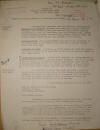
|
26 January 1929.
Minutes of the Meetings of the
Provincial Board,
Bretheren Grossman, Danneberger &
Shimer, Moravian Church.
"Present:
Brethren Grossmann, Danneberger and
Shimer. ¶ ANNOUNCEMENTS. ¶
Superintendent Grossmann made the
following announcements: ¶ Dedication of
Churches: Walpatara September 19th,
present Brethren Grossman and Stortz;
Bilwas Karma December 9th, present
Brethren Danneberger, Haglund and
Grossmann; Raya Bank November 14th,
present Brother Stortz; Layasiksa
November 18th, present Brethren Newton
and Medley Wilson; Irlaya January 6th,
present Brother Stortz. ¶ Critical
Visits. The superintendent took part in
the dedication of the Bilwas Karma
church referred to above and in January
visited Dakura and Sandy Bay. ¶ G. K.
Smith to Bilwi. Brother G. K. Smith
arrived in Bilwi from Karata the end of
October and at once took up his work as
Assistant Pastor of that congregation. ¶
K. Bregenzer to Musawas. Brother Karl
Bregenzer and family arrived in Musawas
sometime during November. Brother
Bregenzer reached the village for the
first time on November 4th but made
several trips for his furnishings before
he took his family from Waspuk Mouth, a
village on the Wangks River whither they
had been brought by motor boat. ¶
PURCHASE OF JUNG HOME. ¶ Mr. F. Jung,
who about five years ago built a house
on leased Mission property very close to
other mission buildings, is returning to
Germany to remain, and in accordance
with the terms of his lease has given
the Mission first preference in buying
the property. His letter outlining the
terms follows: ¶ ‘Bluefields, Nicaragua,
January 11, 1929. ¶ Rev. C. Conrad
Shimer, Treasurer, ¶ Moravian Mission, ¶
Bluefields, Nicaragua. ¶ Dear Brother
Shimer: ¶ Referring to our conversation
re the sale of my house with the
furniture, I beg to make you the
following proposition: ¶ My house
completed represented to me an outlay of
approximately Eight Thousand Dollars
($8,000.00) although built at a time
when conditions were for more favorable
than at present, and under circumstances
which enabled me to obtain first-class
materials and labor as a considerable
saving compared to present day costs. ¶
I now offer this building to the Mission
for Six Thousand Dollars ($6,000.00), of
which I would like to get in Cash
Fifteen ¶ Signed Guido Grossman
(Chairman) ¶ Conrad Shimer (Secretary)"
|
|
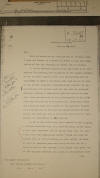
|
1.
26 January 1929.
Despatch from British
Charge d'Affaires
Mr. S. London, Managua, to
Foreign Office, London UK, Public Record
Office, p. 1.
"Sir, ¶
With reference to my telegram No 2 of
today’s date I have the honour to
transmit herewith a copy and translation
of the law imposing an export tax on
bananas. ¶ 2. As an economic measure
this law seems to be singularly
ill–advised. The situation of the banana
industry on the Atlantic Coast is far
from flourishing and the imposition of
such a tax might well lead to one or
more of the banana companies abandoning
the country. It is, however, not yet
certain that the law will be enforced.
Although Article 5 stipulates that the
law is to come into force immediately on
its promulgation in the official Gazette
(on the 21st instant), it seems that
under the Financial Plan the consent of
the American bankers is necessary, and
my American colleague informs me that he
has referred the law to the State
Department at Washington for submission
to the bankers. ¶ 3. As to the
particular point raised in my telegram,
I enclose herewith copy of a
semi-official letter which I have just
received from Mr. Consul Rees (the two
cuttings from ‘The Bluefields Weekly’
which are also enclosed have no direct
bearing on that point). Mr. Rees, it
will be observed, considers that the new
tax is a ‘direct tax’ on the natives of
the Coast ‘for about 70% of the bananas
produced are raised by independent
planters’ . . . "
|
|
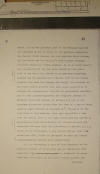
|
2.
26 January 1929.
Despatch from British
Charge d'Affaires
Mr. S. London, Managua, to
Foreign Office, London UK, Public Record
Office, p. 2.
" . . .
By far the greatest part of the bananas
exported are exported by one or other of
the American Companies, the Cuyamel
Fruit Company and the American Fruit
Company at Bluefields and the Bragman’s
Bluff Lumber Company (Standard Fruit) at
Puerto Cabezas. It is on these exporting
companies that the tax will primarily
fall, and I fail to see how a tax levied
on an American exporting company can be
regarded as a ‘direct tax’ on the native
planter from whom the company has bought
its bananas. On the other hand I believe
that some small quantities of bananas
are occasionally exported by independent
planters, and if such planter-exporters
are Mosquito Indians or Creoles within
the meaning of Article III (a) of the
Harrison-Altimirano Treaty, then the
levy of a tax on their exports might
perhaps be regarded as a violation of
the intention of that article. Some days
ago, before I had seen the actual text
of the law, I mentioned the matter in
conversation with the Minister for
Foreign Affairs and expressed the hope
that the provisions of Article III (a)
would not be overlooked. I did not,
however, go into any detail, nor did I
think it advisable to make any formal
representations without your
concurrence. ¶ 4. I am forwarding a copy
of this despatch to the Majesty’s Consul
at Bluefields and am asking him (see
enclosure No 6) to endeavor to ascertain
what proportion of the total banana
exports are . . . "
|
|
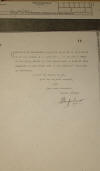
|
3.
26 January 1929.
Despatch from British
Charge d'Affaires
Mr. S. London, Managua, to
Foreign Office, London UK, Public Record
Office, p. 3.
" . . .
exported by independent planters
entitled to protection under the Treaty.
I am instructing him to send a copy of
his reply direct to Your Department. A
copy of this dispatch is also being sent
to His Majesty’s Minister at Guatemala.
¶ I have the honour to be, ¶ With the
highest respect, ¶ Sir, ¶ Your most
obedient, ¶ Humble Servant, ¶ Manfield
Larsen"
|
|

|
27 January 1929 (1909).
Radiogram from CO
Aviation Managua to Major H. H.
Utley, Puerto Cabezas.
"CAPTAIN EDSONS PATROL LOCATED TWO AND
ONE HALF MILES NORTH EAST DIVISION DE
AGUA STOP LIEUT HANNEKENS PATROL
RETURNED SAN ALBINO 1909"
|
|

|
29 January 1929 (1100).
Radiogram from
Major H. H. Utley, Puerto
Cabezas, to Gen. Feland, Managua.
"REPORT
RECEIVED THAT SANDINO AGENT IS
ATTEMPTING TO OBTAIN RECRUITS FROM
LABORERS ALONG RIO GRANDE RIVER PERIOD
NOW INVESTIGATING 1100"
|
|
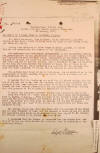
|
30 January 1929.
Statement of
Captain Clyde P. Matteson,
U.S.M.C., p. 1.
"STATEMENT
OF CAPTAIN CLYDE P. MATTESON, U.S.M.C.
¶ Sr. Julio Monterrey, Jues de Mesta, is
an influential planter living at Pal
Punta, about 25 miles above El Gallo on
the Grande River, and below San Pedro. ¶
Having been educated at Baton Rouge
Military Academy, he speaks English and
understands the manners of our
personnel. His influence has contributed
tremendously to the successful control
and indoctrination of the inhabitants of
the upper Rio Grande Valley. Thru his
acquaintance with Mercedes Reyes,
Comandante at San Pedro, the obtaining
of boatmen and boats was punctiliously
accomplished. He used his own boats and
men to perform errands, and to transport
troops and supplies on the trip that
established the outpost at Quepi. One of
these boats was destroyed but Sr. Julio
Monterrey was paid for it. The boatmen
were paid for their services. He stated
that he desired no remuneration. ¶ Two
patrols were taken by me to this place,
and he assisted me in the examination of
trails leading from his place, toward
San Pedro and toward Sicsicwas Creek. ¶
I believe that Sr. Monterrey was paid
for all direct outlay, for the use of
his men and boats, food for boatmen,
which he had collected for me, receipts
having been obtained and turned in to
the A. Q. M. He never mentioned and even
refused remuneration for his personal
services, stating that the presence of
the marines was sufficient for that. ¶ I
recall the following incident having
been related by him to me. ¶ Upon the
return of a river patrol to San Pedro
under 2nd Lieutenant Milo R. Carrol,
U.S.M.C., a stop was made at Sr.
Morrey’s [Monterrey's] home. The patrol
had lost its food, equipment and
outboard engine in the rapids below San
Pedro. Sr. Morray [Monterrey] gave them
food and shelter and the sum of eleven
dollars ($11.00) as a loan to Lt.
Carrol. No remuneration for these was
received by him. ¶ Sr. Morrey
[Monterrey] cooperated whole heartedly
with the marines at all times and was
ever friendly to them, but all expense
to which he was put while the operations
were under my supervision have been
repaid to Sr. Morrey [Monterrey]. No
unfilled promise to Sr. Morrey
[Monterrey] was made by me. ¶ I
recommend that Sr. Morrey [Monterrey] be
commended for his cooperation, and that
if he has any other claims for services,
they be submitted in the customary
manner. ¶ CLYDE P. MATTESON."
|
|
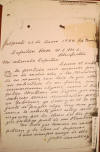
|
30 January 1929.
Statement of
Captain Clyde P. Matteson,
U.S.M.C., p. 2.
Statement
of Sr. Julio Monterrey.
|
|

|
31 January 1929 (1525).
Radiogram from
Gen. Feland, Managua, to Major H.
H. Utley, Puerto Cabezas. "FOLLOWING
RADIO RECEIVED BY NICARAGUAN GOVERNMENT
QUOTE I HAVE RECEIVED FROM LIEUTENANT
CUNNINGHAM OF THE AMERICAN MARINES IN
WASPUC REQUESTING THE RETAINING OF MR
JOAQUIN ALVARADO AS CHIEF OF POLICE OF
WASPUC PERIOD THE TOWN OF WASPUC ASKS IN
THE NAME OF JUSTICE NOT TO HAVE MR
JOAQUIN ALVARADO AS THE CHIEF OF POLICE
IN THIS JURISDICTION PERIOD PLEASE LET
ME KNOW THE RESULT OF THIS CASE AND THE
DECISION SIGNED J INITIAL SARAVIA COMMA
GOVERNOR UNQUOTE GENERALLY CONSIDERED
DESIRABLE NOT TO INSIST ON RETAINING OLD
OFFICIALS WHO ARE NOT DESIRED BY NEW
AUTHORITIES EVEN THOUGH THEY HAVE WORKED
WELL WITH OUR OFFICERS PERIOD DESIRE
YOUR RECOMMENDATIONS IN THIS MATTER
WITHOUT DELAY 1525"
|
|
|
|
|
PREVIOUS
NEXT |
|
|
|
|
|
|
|
